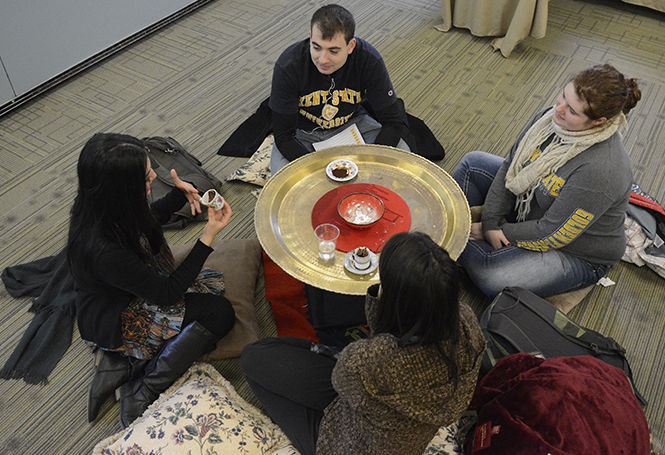Turkish students explain fortunes, culture during International Education Week
November 20, 2014
Turkish students read fortunes from coffee grounds as part of Kent State’s International Education Week celebration Thursday morning in room 200 of White Hall.
Evren Koptur, a graduate educational psychology major, said the event was set up to mimic the inside of a Turkish restaurant.
“People gather around the table, not just in the house but public places like restaurants,” Koptur said.
A social lifestyle is an important part of Turkish culture, he said. Friendship and family ties are very strong. Coming together to drink coffee and tea creates a way to bond and converse.
Participants were greeted with rose water, a traditional custom in Turkish homes.
“It’s a way of custom and cleansing,” said Linda Robertson, director of the Gerald H. Read Center for International and Intercultural Education. “It’s a way to cleanse before we shake hands. It’s a sign of respect.”
Once students and faculty took their seats, they were offered a choice of coffee or black tea.
Esra Eliustaoglu, a graduate math specialization major, said he’s noticed a major difference between coffee and tea drinking in American and Turkish cultures.
“We don’t have that take away culture with our coffee and tea as Americans do,” he said. “You need to have a conversation. It’s a social drink and that’s what makes the drink so special.”
Eliustaoglu said Turkish tea and coffee are stronger than the American versions, and as a result, Turkish coffee drinkers use smaller cups.
Ece Gogebakan, a graduate clinical mental health counseling major, demonstrated the special way tea is poured and shared the cultural significance behind drinking coffee on special occasions, like weddings.
“When you’re to be married, the groom must drink coffee with lemon and salt in it,” Gogebakan said. “It’s sort of a prank on the groom, but it’s tradition.”
Laura Graham, a senior recreation, park and tourism management major, said she enjoyed the event, even though she doesn’t believe in fortune telling.
“I’m glad I got to come,” Graham said. “I was skeptical at first. I half believe in this stuff, but mostly don’t.”
Koptur said he thought the event showcased the Turkish culture, heritage and traditions well.
“This is a reflection of our social life,” Koptur said. “We live in a global environment and to be a diverse person you have to be in contact with different cultures.
Contact Teahl Rice at [email protected].

























